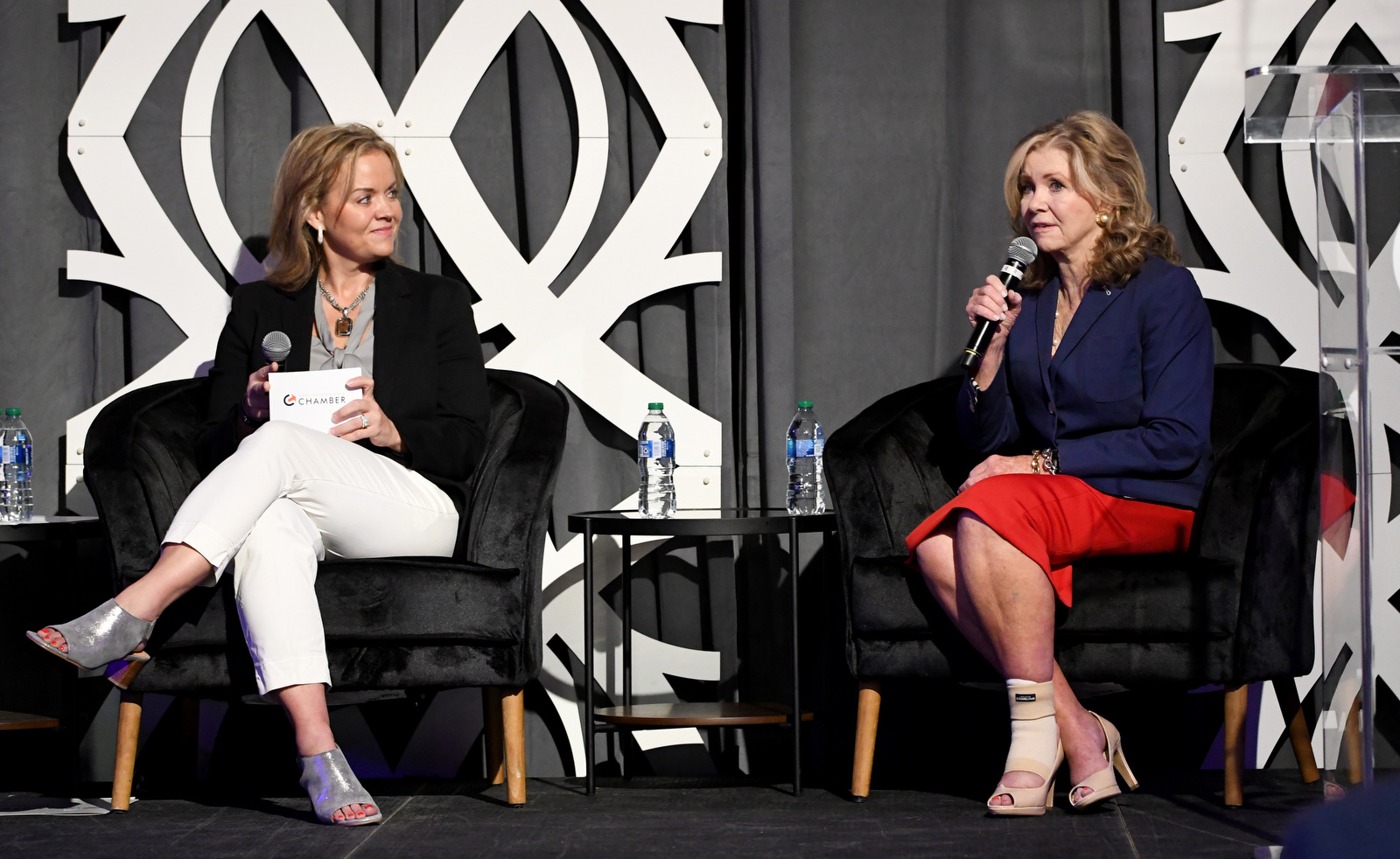As EPB activates America's first commercial quantum network this summer in Chattanooga, more than three dozen academic, business and political leaders gathered Tuesday at the University of Tennessee at Chattanooga to explore ways to grow the new quantum technologies in Chattanooga.
U.S. Sen. Marsha Blackburn, R-Tennessee, who serves on the Senate Subcommittee on Communications, Media and Broadband, has introduced two bipartisan bills this year to promote more public and private partnerships and offer additional federal support for developing quantum-based technologies in computing, communications, medicine and other areas. Blackburn's bills would help establish both the National Quantum Initiative Program and the Manufacturing USA Institute for Quantum Manufacturing for more cooperation and support for quantum research and development by both the National Science Foundation and the Department of Energy's national labs, including the Oak Ridge National Laboratory.
"Tennessee is home to quantum applications that have become critical as our nation competes on the global stage," Blackburn said when she introduced her latest bill with Sen. Gary Peters, D-Michigan. "Improving coordination at the national level will further equip our quantum communities, like Chattanooga, to make progress in critical sectors, including workforce development and supply chain management."
During a visit to UTC on Tuesday, Blackburn said she is eager "to see Chattanooga grow as a tech hub" using its new quantum network built on the fiber optic network of EPB, which pioneered the nation's first citywide high-speed internet more than a decade ago.
EPB began testing quantum technologies five years ago in a research partnership with a San Diego-based technology firm, Qubitekk, that was funded by the U.S. Department of Energy to develop a more secure electric grid. Qubitekk developed a means of using EPB's fiber optic network to connect quantum nodes and allow researchers and startup companies to share information and test technologies on what will be the first commercial quantum network in the world in Chattanooga.
Quantum technology harnesses single particles of light, or photons, to distribute cryptographic keys that can be used to secure control signals with quantum keys to protect the electric grid.
The same technology can also be deployed to dramatically boost the capacity of today's supercomputers. Quantum computing is expected to provide several times the capacity of the world's fastest computer, surpassing even the Frontier computer in Oak Ridge, which is capable of performing up to 2 quintillion calculations per second.
Such high-speed, high-capacity computers are becoming increasingly important as artificial intelligence systems are deployed in more industries, according to Ryan Harring, director of partnerships and alliances for computer developer IonQ.
"We're in talks (with EPB) about the next steps needed to move a partnership forward, but obviously, if you have a quantum network, the next big thing you need to know is how to connect a quantum computer to that network," Harring said in an interview Tuesday. "Artificial intelligence is going to be something that ultimately accelerates due to the technological advances of quantum computing and the quantum network as well."
EPB President David Wade said the utility is talking with a variety of technology businesses, research institutions and government agencies about developing and testing quantum technologies on the new network. Tuesday's roundtable included representatives from across the nation from such businesses as IBM, Microsoft, Enzo and Volkswagen, among others.
EPB and Qubitekk have invested about $4.5 million to develop the first commercial quantum network. Although no customers have yet committed to using EPB's quantum network, Wade said Tuesday he expects to begin to serve new customers by this fall and hopes to build such startup ventures into an eco-system of support for emerging quantum technologies.
"As America's first purpose-built resource for moving quantum technologies out of the lab and into commercial application, EPB Quantum Network is filling a missing link in our nation's quantum competitiveness," Wade said.
The EPB president praised Blackburn for working to provide resources for a comprehensive economic ecosystem including R&D, workforce preparation, end-to-end manufacturing and supply chain strategy.
Earlier this year, Blackburn joined with U.S. Sen. Ben Ray Luján, D-New Mexico, to propose the Quantum Sandbox for Near-Term Applications bill, establishing a public-private partnership for quantum development and applications.
"While Communist China has publicly acknowledged their goal to lead the world in quantum communications by 2049, it's critical the United States provides an environment for entrepreneurs and companies to promote competition and continued innovation," Blackburn said at the time.
UTC's Center for Urban Informatics and Progress, which is studying a number of smart city initiatives, will be one of the first nodes connected to EPB's quantum network. UTC will train students on quantum technologies as well as use the quantum grid to analyze and test a number of Smart City computerized programs.
Blackburn said she is eager to promote academic research into commercial business applications to use quantum technologies to advance design, testing and manufacturing in the private sector.
"The quantum network at EPB in Chattanooga is a perfect sandbox, shovel ready, for quantum innovation," Duncan Earl, president and chief technology Officer of Qubitekk, said in a statement.
Contact Dave Flessner at dflessner@timesfreepress.com or 423-757-6340.
 Staff Photo by Robin Rudd / U.S. Sen. Marsha Blackburn speaks during the panel discussion. EPB presented Federal Focus at the Signal, with Rob Engstrom, founder and CEO of Wolfe Street Partners, Blackburn and U.S. Rep. Chuck Fleischmann, on Tuesday. Blackburn later took part in a quantum roundtable at UTC.
Staff Photo by Robin Rudd / U.S. Sen. Marsha Blackburn speaks during the panel discussion. EPB presented Federal Focus at the Signal, with Rob Engstrom, founder and CEO of Wolfe Street Partners, Blackburn and U.S. Rep. Chuck Fleischmann, on Tuesday. Blackburn later took part in a quantum roundtable at UTC.
